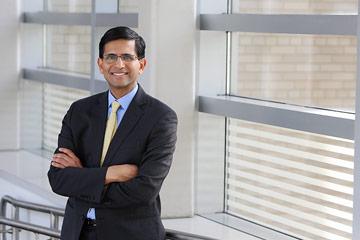Sanjay Rajagopalan, a leading Cleveland cardiovascular physician scientist, has been awarded a $7.5 million federal grant to support research on how the environment affects human health, and especially Type 2 diabetes and cardiovascular disease.
Rajagopalan, the Herman Hellerstein, MD Professor of Cardiovascular Research and director of the Case Cardiovascular Research Institute at the Case Western Reserve University School of Medicine, is among an elite group of physician scientists whose work has helped identify and better understand the impact of environmental risk factors on cardiovascular disease.
The eight-year, $7.5 million Revolutionizing Innovative, Visionary Environmental health Research (RIVER) award from the National Institutes of Environmental Health Sciences—part of the National Institutes of Health—will allow Rajagopalan’s laboratory to build on a decade of work to investigate gene-environmental interactions that lead to chronic non-communicable diseases, including Type 2 diabetes and cardiovascular disease.
“This transformative award should enable other important collaborations that will shed light on the growing importance of environmental influences on health,” said Rajagopalan, who is also chief of cardiovascular medicine at University Hospitals (UH) Harrington Heart & Vascular Institute. “With a recognition of the key facilitative role of factors such as anthropogenic air pollution on climate change and the increasing dominance of chemicals in the environment, there is unprecedented interest in the influence of pollutants on health in general, and cardiometabolic health in particular.”
“Dr. Rajagopalan’s innumerable contributions in the area of environmental health have been crucial in laying a foundation of mechanistic evidence for the deleterious impact of pollutants, and air pollution in particular,” said Mukesh Jain, the Ellery Sedgwick, Jr. Chair and Distinguished Scientist in the Department of Medicine and Distinguished University Professor at Case Western Reserve, chief academic officer at UH, and chief scientific officer at Harrington Discovery Institute at UH. “He has also been instrumental in leading policy and scientific statements from organizations, including the American Heart Association, the American College of Cardiology (ACC), American Thoracic Society and European Society of Cardiology, and in shaping global public opinion on the importance of environment on human health. This award should further enable Dr. Rajagopalan to have international impact through his studies.”
This award will use novel experimental models and will tap into large genomic databases to understand gene-environmental interactions on circadian disruption that may then lead to major health challenges, including Type 2 diabetes and cardiovascular disease. Rajagopalan is an elected member of the American Society of Clinical Investigation and the American Association of Physicians, and received ACC’s 2021 Distinguished Scientist Award.


